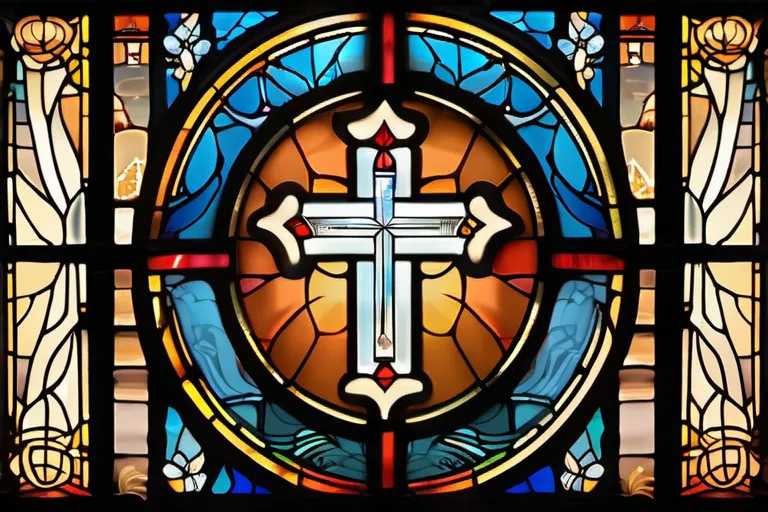Explore the fundamental ideas that shape Christian faith, from the Holy Trinity to Salvation.
Dive into the rich tapestry of Christianity as we delve into its core concepts and beliefs. From the Holy Trinity to salvation, this article will provide a comprehensive overview of the essential elements of this global religion.
The Holy Trinity: Father, Son, and Spirit
Imagine Christianity as a vast ocean, and at its heart lies the Holy Trinity—a concept both profound and enigmatic. How can three persons—Father, Son, and Spirit—be one God? This is not just a theological puzzle but a cornerstone that defines Christian faith.
The idea of the Trinity challenges our human understanding, as it goes beyond the limitations of our minds. Just like trying to grasp the shape of a sphere with only two hands, grasping the concept of three persons in one God stretches our comprehension. Yet, this complex yet central belief is woven into the very fabric of Christian theology.
Where did this mysterious idea come from? The origins of the Trinity are shrouded in history, emerging gradually over centuries through a combination of scriptural interpretation and early church councils. But what does it mean for our lives today?
The Holy Trinity is not just an abstract concept; it’s a living reality that shapes our understanding of God’s relationship with humanity. The Father represents divine love and fatherhood, the Son embodies salvation through his life and sacrifice, and the Spirit connects us to God in ways we can barely fathom. Together, they form a dynamic unity that is both mysterious and comforting.
How does this belief impact our daily lives? When we pray, for instance, we are addressing three persons in one God—Father, Son, and Holy Spirit. This interconnectedness of the divine persons gives us a sense of being part of something greater than ourselves, a community bound by faith.
The Holy Trinity is like a intricate tapestry, with each thread representing a distinct person but all woven together to form a cohesive whole. It’s a concept that invites us to explore the depths of our faith and appreciate the complexity and beauty of Christian belief.
The Bible: The Foundational Text of Christianity
The Bible stands as the cornerstone of Christian faith, a text that shapes beliefs and practices like few others have done before it. But what exactly makes this ancient collection of books such a powerful foundation? Isn’t it just a bunch of old stories written by people long gone? Not quite. The Bible is far more than mere tales; it’s the voice of God speaking to humanity, a narrative that weaves together history, prophecy, and personal testimony.
Consider the Bible as a vast river, its waters flowing from countless streams, each representing different books—gospels, epistles, wisdom literature. Each stream holds significance, but their true power comes when they join forces, creating a powerful current that guides Christian life and thought. The Old Testament, with its rich tapestry of history, law, and prophecy, prepares the ground for understanding the New Testament’s message of redemption.
Can we truly understand Christianity without delving into these texts? Hardly. The Gospels tell us about Jesus’ life and teachings; they are like windows that reveal the heart of God. The Epistles, written by early church leaders, offer practical guidance on living a Christian life in every day situations. Even Revelation, often seen as abstract, is filled with profound imagery that helps us see into the future from a divine perspective.
The Bible isn’t just read; it’s experienced. Christians believe its teachings are alive and active, capable of transforming lives. Is there any other book in human history that has so profoundly influenced art, music, philosophy, and culture? The impact is undeniable. Through the Bible, we find not only answers but also questions—questions that challenge us to think deeply about our purpose in life, our relationship with God, and how we should live.
In essence, the Bible is more than a book; it’s a living voice, guiding us through both the joys and struggles of faith. Without this foundational text, Christianity would be like a tree without roots—rootless and lacking in substance.
So, as we continue our journey into Christian beliefs and practices, remember that every step forward is built upon these ancient yet timeless words. The Bible isn’t just important—it’s essential for understanding the depth and breadth of Christianity’s teachings and how they shape a faithful life.
Salvation: Redemption and Eternal Life
Imagine a journey that takes you from sin to salvation, from darkness to light. In Christianity, Salvation stands as the ultimate goal—a journey where one finds redemption and eternal life. But what does this mean exactly? Is it merely about escaping a temporary purgatory, or is there more to it?
The idea of Salvation in Christianity revolves around the belief that humans are inherently flawed and sinful. Just like a broken compass veering off course, our lives can easily stray from the path of righteousness. The concept of Salvation offers a way back to God, through faith in Jesus Christ.
‘Can we truly understand what it means to be saved without knowing who saves us?’ asks the faithful. This question delves into the heart of Christian doctrine, where faith in Christ is seen as both a belief and an action. It’s not just about believing that Jesus exists; it’s believing in His power to forgive and restore.
The process of Salvation isn’t solely about individual effort or merit but is often described through the metaphor of a garden where seeds (words of God) are planted, watered by faith, and nurtured by good works. This journey involves not only accepting Jesus as Lord but also living according to His teachings.
One might wonder: How does one achieve this state of salvation? The answer lies in the Bible, which outlines the path through its commandments and promises. But more importantly, it is realized through a personal relationship with Jesus, where every step we take towards goodness and kindness is seen as part of our journey.
Ultimately, Salvation in Christianity is about finding a new life filled with purpose and meaning. It’s not just about the destination but the journey itself—full of challenges, growth, and moments of joy. As we walk this path, we’re reminded that every step forward brings us closer to Eternal Life in God’s presence.
So, as you ponder on your own salvation, consider how faith and good works intertwine to shape a life dedicated to Christ’s teachings. Are you willing to take that first step towards redemption?
The Church: Community and Spiritual Growth
The church, a metaphorical ship sailing through turbulent waters, plays a pivotal role in Christian life. Imagine it as a shelter, not just from the storms of life but also a sanctuary where souls find solace and growth. How does this community shape our understanding of faith? The church isn’t merely a building; it’s a living organism, breathing with the spirit of its members.
From ancient times to modern days, the structure of the church has evolved. But one thing remains constant: its commitment to fostering spiritual growth and providing guidance through both joyous celebrations and somber moments. The early Christians met in secret, hiding like seeds waiting for the right conditions to bloom. Over centuries, they grew into a visible institution, yet the essence of community remained intact.
Think of the church as a garden, where each member contributes to its well-being through their unique gifts and talents. Some nurture the soil, ensuring healthy roots; others water the plants, providing necessary nourishment. How do you find your place in this garden? Whether you’re a seasoned gardener or just planting seeds for the first time, every contribution is valuable.
The church also serves as a bridge between heaven and earth. It connects us to the divine through worship, teaching, and service. In what ways can we strengthen our connection to the divine within this community? Through regular attendance at services, engaging in Bible studies, or participating in charitable acts—each activity helps deepen our spiritual journey.
Moreover, the church provides a network of support for its members. It offers counseling, prayer groups, and fellowships that help believers navigate life’s challenges. How do you feel supported within your local congregation? These connections can be crucial during times of struggle or celebration.
In essence, the church is more than just a place; it’s a dynamic force in shaping Christian faith. It embodies the community aspect of Christianity, offering growth, support, and a deeper understanding of spiritual truths. As we continue our journey through the concepts of Christianity, remember that each step taken within this community brings us closer to a fuller, richer faith.
Sacraments: Holy Rites and Symbols
Sacraments: Holy Rites and Symbols
Imagine a sacred garden where each step you take is imbued with divine significance. In this garden, the Catholic Church offers seven sacraments as holy rites, symbols that invite us into deeper communion with God and each other. How do these sacraments shape our Christian journey?
- Baptism: This is not just a ritual; it’s the first step on your spiritual path, like being born anew in Christ’s likeness.
- Penance: Also known as Confession, this sacrament offers healing and forgiveness. It’s like cleansing a wound to prevent infection and promote healing.
- Holy Eucharist: The Communion is a powerful reminder of Christ’s sacrifice. Each time you receive the bread and wine, are you truly present at the table where Jesus sat with His disciples?
- Anointing of the Sick: This sacrament brings comfort to those who are ill or in pain. It’s like a balm that soothes not just the body but also the soul.
The remaining sacraments—Confirmation, Holy Orders, and Matrimony—are more about roles and responsibilities within the faith community. Confirmation gives us the strength of the Holy Spirit, much like receiving armor to face battles; Holy Orders sets aside individuals for leadership in the Church; and Matrimony unites two souls in a bond that reflects God’s love.
Through these sacraments, Christians are not just passive observers but active participants in the life of Christ. Each one is a bridge between Heaven and Earth, inviting us to experience the presence of God in our everyday lives. How do you see yourself engaging with these holy rites? Are they more than just rituals; are they part of your spiritual toolkit?
Christian Morality: Living a Life of Faith
How do you define Christian morality? Is it a set of rules that dictate every single action we take, or is it more about living in harmony with God’s will? In exploring Christian morality, believers are guided by principles that shape their daily lives and interactions with others. The idea is not just to follow a list of dos and don’ts but to embody the love and compassion that Christ exemplified.
At its core, Christian morality stems from the teachings found in the Bible. Key concepts such as the Ten Commandments, the Beatitudes, and the Sermon on the Mount provide a framework for ethical living. For instance, consider the commandment to love thy neighbor as thyself (Matthew 22:39). How do you practice this in your daily life? Is it about giving money or spending time with those who are less fortunate, or is it something more profound—a deep understanding of their needs and a willingness to serve them?
Christianity also emphasizes the importance of grace. Just as Jesus forgave his crucifiers, believers are called to forgive others. But this isn’t just about letting go; it’s about transforming relationships. How does forgiving someone change your perspective on them? Is forgiveness an act of strength or weakness?
In addition, the concept of justice is integral to Christian morality. Jesus taught that we should not only love our neighbors but also work towards social justice and equality. This could mean advocating for fair treatment in the workplace, speaking out against oppression, or supporting policies that benefit marginalized communities. How do you balance your personal convictions with societal norms when it comes to justice?
Lastly, charity—or giving freely without expecting anything in return—is a cornerstone of Christian morality. It’s not just about donating money; it’s about showing genuine care for others. Acts like volunteering at a food bank or helping a friend in need are tangible expressions of this charity. What small acts can you do today to show love and compassion?
Ultimately, Christian morality is a journey of continuous growth and reflection. It challenges us to live in ways that honor God’s love and grace while seeking to make the world a better place. How will you embody these principles in your life today?
Conclusion
 By understanding these key concepts, you’ll gain a deeper appreciation for Christianity and its impact on culture, society, and individual lives.
By understanding these key concepts, you’ll gain a deeper appreciation for Christianity and its impact on culture, society, and individual lives.











